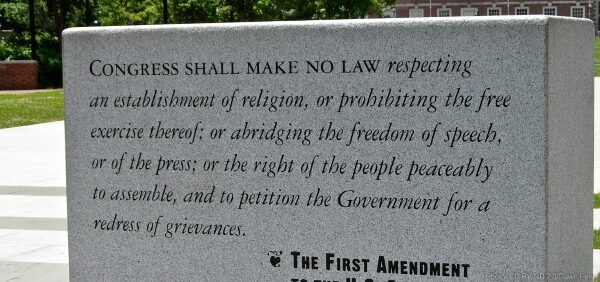January 16th is Freedom of Religion Day and in his annual proclamation today, President Obama said
“When the Virginia Statute for Religious Freedom was adopted on January 16, 1786, it formed a blueprint for what would become the basis for the protection of religious liberty enshrined in our Constitution. Drafted by Thomas Jefferson, the statute proclaims that 'all men shall be free to profess, and by argument to maintain, their opinions in matters of religion, and that the same shall in no wise diminish, enlarge, or affect their civil capacities.' The First Amendment prohibits Government from establishing religion, and it protects the free exercise of every faith. Our Government does not sponsor a religion, nor does it pressure anyone to practice a particular faith, or any faith at all. The United States stands for the protection of equal rights for all people to practice their faith freely, without fear or coercion, and as Americans, we understand that when people of all religions are accepted and are full and equal members of our society, we are all stronger and freer.”
Freedom of religion is one of our most fundamental rights as Americans. For almost 100 years, the ACLU has been protecting religious freedom, from defending a student’s right to read his Bible during reading period to the right of a Muslim man to wear his religious headwear in a courtroom.
In Montana, ACLU of Montana brought a human rights complaint (Knows His Gun v. Crossroads Correctional Center) against the state of Montana , Crossroads Correctional Center and Corrections Corporation of American on behalf of Native American inmates at the Crossroads Correctional Center in Shelby, Mont., whose rights were violated through en-masse strip searches, being denied the ability to properly celebrate sweat lodge ceremonies and being retaliated against when they complained about the mistreatment.
State and federal constitutions protect not only the right to believe (or not to believe), but also the right to express our religious beliefs. In this country, we have the absolute right to believe whatever we want about God, faith, and religion, and we have the right to act on our beliefs—but we do not have the right to harm others.
The last few years have been ripe for challenges based on religious freedoms. From challenges to same gender marriage, to basic protections in housing, employment and public accommodations for LGBTQ persons, and denial of prescriptions and medical treatment based on gender in the form of basic birth control, the issue of religious freedom has been front and center in the public conscience.
In other recent cases, bakers, florists, photographers and wedding venues have asserted their religious liberty in order to justify their discrimination against LGBTQ persons.
Rev. Dr. John C. Dorhauer, elected leader of the United Church of Christ (UCC), institutional descendants of the Pilgrims and whose roots reach back to the Mayflower, offers a profound testimony to the roots of religious freedom in the preface to a recent study by Political Research Associates
“As proud as I am of my Pilgrim Congregationalist history, I am also aware that within that history is the Puritan experience of the Salem witch trials and the treatment of indigenous peoples: reminders of how religion writ large as a culture's moral compass can bring out the worst in us. By the time our Constitution was written, both the desire to be free from religious tyranny found in the spirit of the Pilgrims - and the need to protect ourselves from religious zealots like the Puritans - would serve to inform its authors. They treated both as instructive, writing into the Bill of Rights language that would preserve our religious liberty and restrict the government's power to establish any religious point of view as normative.
“I believe in religious freedom, but not the kind that argues that government should tolerate employers or medical care professionals who want to deprive women of their full range of health care options. Depriving women of choices that our courts deem legal and appropriate to preserve my religious misogyny is not my idea of religious liberty.”
The protections for religious freedom were never meant to be used as a sword to harm others, but rather as a shield for individuals from an oppressive government.

